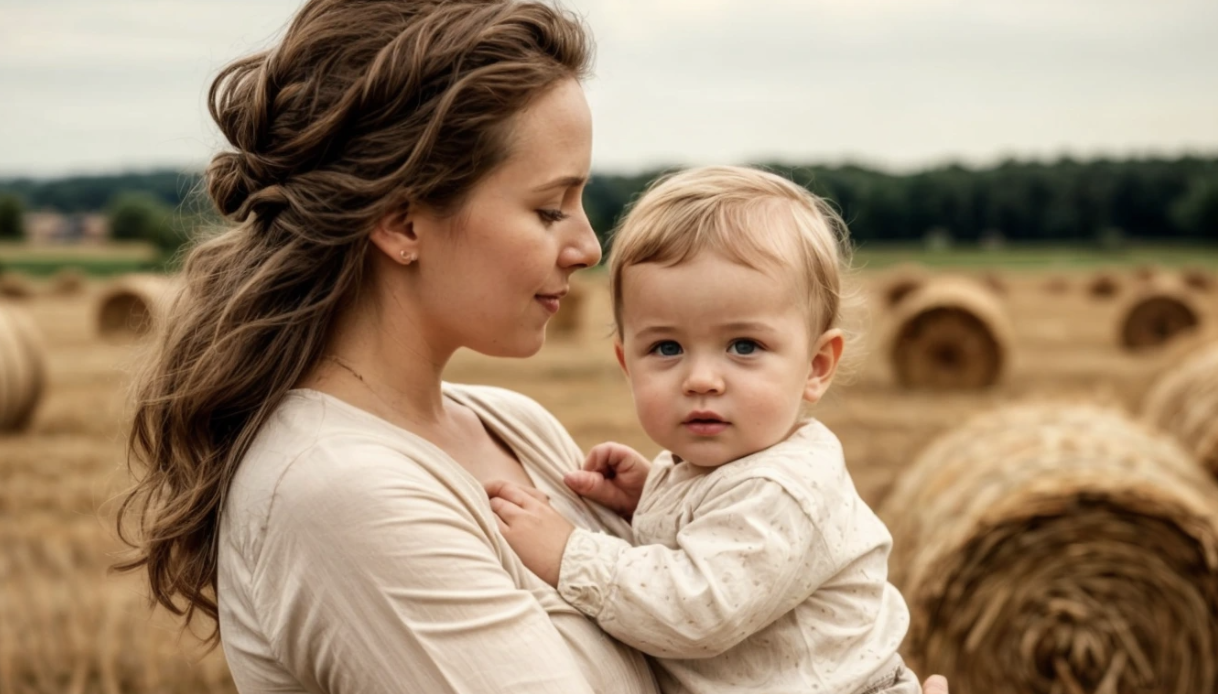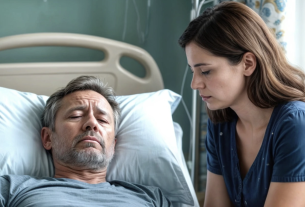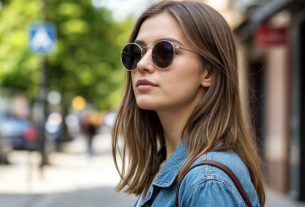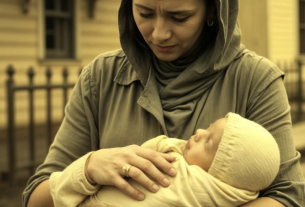Stop!” I shouted across the entire field, but the small figure kept slowly moving between the stalks.
August was scorching hot. I was returning from the river, carrying a bucket of laundry, when I noticed her — a five-year-old girl in a shabby dress. She was walking strangely, as if in a trance.
“Hey, little one!” I set the bucket on the edge of the field path and ran to her.
The girl turned around. Her huge brown eyes looked right through me. A dried scratch darkened her cheek.
“What’s your name?” I squatted down in front of her.
Silence. Only the wind rustled the wheat around us.
“Where is your mother?” I asked softly.
She slightly tilted her head, then raised her thin hand and pointed into the distance.
“There’s no one there, dear. Come with me, you’ll get warm and have something to eat.”
Taking her icy cold hand — despite the heat, it was cold — I led her toward the house. The girl walked obediently, occasionally glancing back at the endless field.
Ivan was working in the garden. Seeing us, he straightened up.
“Masha, who’s this?”
“Found her in the field. She was alone. Not saying a word.”
He came over and sat down next to us.
“Hi. I’m Uncle Vanya. Want a carrot?”
He pulled a peeled carrot from his pocket. The girl took it and carefully bit off a piece.
“We should report this to the police,” he said quietly.
“First, let’s feed her and wash her up. Look at her.”
In the kitchen, I seated the child at the table, poured some milk, and put out some bread. She ate slowly, carefully, almost silently. Sometimes she would freeze, as if listening to something far away.
“Do you remember your name?”
She shook her head.
“And where did you come from?”
She again pointed somewhere into the air.
“Maybe she’s a gypsy?” Ivan guessed. “A caravan passed nearby recently.”
“She doesn’t look like one. More like a lost child.”
I took her to the bathhouse, washed off the dirt, and treated her wounds with iodine. Under the layer of dust and grime was fair skin and thin light hair. I dressed her in my old shirt — it hung loosely, but was clean.
That evening, the local policeman Stepanich arrived. He examined the girl and noted her description.
“No one in the area has been reported missing. I’ll check neighboring districts. Meanwhile?”
“She’ll stay with us,” I said firmly.
Ivan nodded.
“I’ll come by tomorrow.”
At night, the girl woke up frightened and ran to me. She wrapped her arms around me, trembling.
“Shh, shh, I’m here. No one will hurt you.”
I stroked her head until she calmed down. Then I lay down next to her on the folding bed in the room.
“Mom?” she whispered suddenly.
My heart stopped.
“What is it, dear?”
But the girl was already asleep again.
A week passed. Stepanich came by every day — no news. The girl still didn’t speak, only murmured something unintelligible in an unknown language in her sleep.
“Maybe she’s a foreigner?” Ivan suggested at dinner.
“There aren’t any foreigners out here,” I said.
The child sat nearby, finishing her potatoes. After a week, her cheeks had pinked, her gaze was livelier.
“Maybe we should give her a name?” my husband proposed. “It’ll be easier that way.”
“What if she has a name? She might remember it.”
“Let’s pick a temporary one.”
I looked at the girl. She lifted her eyes — brown with warm golden flecks.
“Katya,” I said suddenly. “She looks like my grandmother Katya when she was a child. The same eyes.”
The girl smiled for the first time in all that time.
Autumn came early. We baptized her Katya — and she slowly settled in. She helped around the house: fed the chickens, gathered eggs. She started talking — first separate words, then short phrases. But nothing about the past.
“Mom, water,” she said one morning.
I froze with the kettle in my hand. Ivan even looked away to hide the shine in his eyes.
“What did you say?”
“Water, please… mom.”
I hugged her tightly, unable to let go.
In October, a letter arrived from the district — no one was looking for the girl. They suggested sending her to an orphanage.
“We won’t give her up,” Ivan said firmly. “We’ll arrange guardianship.”
“And if her parents are found?”
“We’ll deal with it. But not an orphanage.”
We began the bureaucratic process — documents, checks, commissions. They inspected the house, asked about income. Katya hid behind my skirt around strangers, not saying a word.
“The child is a bit strange,” the social worker remarked. “Maybe it’s better to send her to specialists?”
“She’s not strange,” I answered. “Just scared. She needs a home, not experts.”
By New Year, the paperwork was ready. Katya officially became our ward.
“Now you’re ours,” Ivan said, lifting her up. “Forever.”
The girl hugged him around the neck and whispered:
“Papa…”
Something inexplicable happened that winter. Waking up in the night, I saw Katya standing by the window, looking at the white field beyond the glass.
“Katya, what are you doing here?”
“They left,” she replied quietly. “Gone for good.”
“Who left, dear?”
She turned around, her face serious, almost adult in the moonlight.
“I don’t remember. But they won’t come back.”
I held her close, led her away from the window, laid her back down. She never went to the window at night again.
In spring, Katya blossomed. She ran in the yard, laughed, hummed her songs. She learned to read quickly, as if she had always known the letters. She drew strange patterns — circles, curls, signs we couldn’t understand.
“What is this?” I asked sometimes.
“It just happens,” she answered simply.
In May, my sister came from the city. Seeing Katya, she gasped:
“Masha, she’s your spitting image as a child! Like your own daughter!”
She looked at Katya — and indeed, they were alike. The same cheekbones, the same eye shape. Only the hair was lighter.
“It’s fate,” my sister said. “It can’t be just a coincidence. God brought you together.”
In summer, exactly a year after I found her in the field, the girl woke up and quietly said:
“Mom, I remembered.”
My heart stopped.
“What did you remember?”
“That I have always been yours. I just took a long time to find you.”
I hugged her, unable to hold back tears. At that moment Ivan came in.
“What happened?”
“Papa,” Katya smiled through her tears, reaching out to him, “I remembered: I’m your daughter. Always have been.”
Years passed quickly. Katya grew into a smart, kind girl. The top student at school, helper around the house, the heart of the village kids’ group.
At fourteen, she won the district math Olympiad.
“You need to go study in the city,” Ivan said. “University, career — everything ahead.”
“But what about you?” she worried.
“We won’t go anywhere. This is your home, and you’ll come back like family.”
That evening, the three of us sat on the porch. Katya between us, her head on my shoulder.
“Mom, tell me again how you found me.”
I told the story for the hundredth time, but it was important to her. She listened attentively, smiling.
“I found you in the field, five years old, and raised you like my own. And now you call me Mom. And that’s the best thing we have,” I finished.
“You know,” Katya said thoughtfully, “I sometimes dream the same dream. I’m standing in white light, and a woman says, ‘Go, they’re waiting for you.’ And she points to our field.”
“Maybe it was an angel,” Ivan guessed.
“Maybe an angel…”
When Katya turned eighteen, she entered medical school. Ivan and I went to see her off — all three of us cried. She came home for holidays — the house immediately filled with joy.
“Mom, I met a guy,” she admitted in her third year. “His name is Sergey. He’s a doctor too.”
“Bring him over, we’ll meet.”
Sergey turned out to be a good man — serious, hardworking. Ivan approved him immediately.
“He’s reliable,” Ivan said later. “You can trust him.”
The wedding was held in the village. Katya in white — simply stunning. She cried tears of happiness all day.
“Thank you for everything,” she whispered hugging us.
Two years later, they had a son — little Ivan, like his grandpa. Then a granddaughter — Masha, like her grandmother. Katya and Sergey worked in the district hospital but came to visit every weekend. The house filled again with children’s laughter and warm life.
One day, when little Ivan turned five — exactly how old Katya was when we found her — something strange happened.
We were walking as a family, reached that very field. Ivan suddenly stopped and pointed into the distance:
“Mom, someone’s standing there.”
We looked — no one. Only the wheat swayed in the wind.
“There’s no one, dear.”
“There is! A woman in a white dress. She’s waving and saying ‘thank you.’”
Katya paled and sat down beside us.
“What else is she doing?”
“Just standing and smiling.”
The boy saw nothing else, but from that day something changed in Katya. She became calmer, more confident, as if some invisible journey had ended.
That evening, we sat on the porch. The grandchildren were asleep; Ivan and Sergey played chess.
“Mom,” Katya said quietly, “I think I’ve started to remember.”
“What do you remember?”
“Not everything, just a feeling. Like I was guided to you. Let go to find a home. So that you would have a daughter, and I would have a family.”
“Nonsense,” I answered, but my voice trembled.
“No, not nonsense. I’m yours. Not by blood, but by heart — family.”
I hugged her like back then, many years ago, when I first held the frightened little girl close.
“You’re ours. The dearest of all.”
“And you know, Mom… When Ivan was born, I realized the circle was complete. The love you gave me, I pass on. And it will always be passed on.”
We were silent, watching the sun slowly set beyond the horizon. That very field, the very place where our story began.
A story about a girl who came from nowhere and became the closest person. A story about how family is not necessarily about blood ties. It’s about love, care, and years spent together.
“Time to go inside,” Ivan said. “It’s getting chilly.”
We stood up and went in. Katya hugged us both.
“I love you. Thank you for not giving me away then. Thank you for believing in me.”
“We love you, daughter,” I replied. “People can be family not by birth, but by heart. And you are our true miracle.”
And that was the pure truth.



